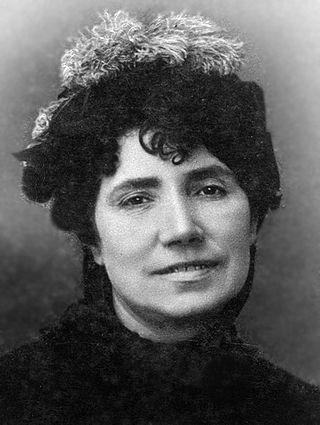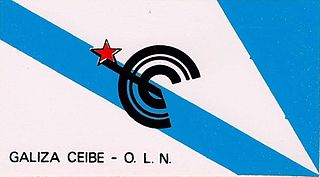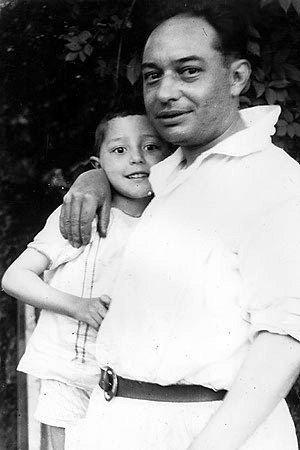
María Rosalía Rita de Castro, was a Galician poet and novelist, considered one of the most important figures of the 19th-century Spanish literature and modern lyricism. Widely regarded as the greatest Galician cultural icon, she was a leading figure in the emergence of the literary Galician language. Through her work, she projected multiple emotions, including the yearning for the celebration of Galician identity and culture, and female empowerment. She is credited with challenging the traditional female writer archetype.

Alfonso Daniel Manuel Rodríguez Castelao, commonly known as Castelao, was a Galician politician, writer, painter and doctor. He is one of the fathers of Galician nationalism, promoting Galician identity and culture, and was one of the main names behind the cultural movement Xeración Nós. He was also one of the founders and president of the Galicianist Party and had a great influence on the renovating group of Galician art known as Os renovadores. Castelao is considered to be the most important figure in Galician culture of the 20th century.

Ricardo Carballo Calero, self-styled as Ricardo Carvalho Calero from 1981 onward, was a Spanish philologist, academic and writer. He was the first Professor of Galician Language and Literature at the University of Santiago de Compostela. He was a member of the Royal Galician Academy, the Lisbon Academy of Sciences, and also an honorary member of the Galician Language Association. He was one of the main theorists of contemporary Galician reintegrationism and his works on this field are considered a primary reference. Many consider Carballo Calero as one of the most prominent figures of the twentieth century Galician intelligentsia.

Luis Seoane (1910–1979) was a lithographer and artist. Born in Buenos Aires, Argentina on June 1, 1910, of Galician immigrants, he spent much of his childhood and youth in Galicia (Spain). He was educated in A Coruña. His first exhibition was held in 1929. He is usually included in the group of Os renovadores, the renovators of Galician art in the first third of the 20th century.

A Nosa Terra was a Galician newspaper in Galician language, first founded in 1907 in A Coruña, Spain. It has been published in different periods.
Reintegrationism, or Lusism, is a linguistic movement in Galicia that advocates for the recognition of Galician and varieties of the Portuguese language as a single language. Reintegrationists argue that the different dialects of Galician and Portuguese should be classified as part of the Galician-Portuguese language, rather than two languages within a common branch. The largest reintegrationist association is the Galician Language Association (AGAL).

Antón Villar Ponte . He was one of the most important galicianists before the civil war. As a journalist he worked in A Nosa Terra, Nós, La Voz de Galicia, El Pueblo Gallego, and El Noroste.
The Associaçom Galega da Língua is a reintegracionist group created in 1981 that aims for the full normalization of the Galician language, which it considers to be a branch of the Galician-Portuguese language. Contrary to the norms of the RAG, its Comissom Lingüística published its own norms in 1983 titled Estudo crítico das normas ortográficas e morfolóxicas do idioma galego. Today, these norms, revised and expanded, are condensed in the work Ortografia Galega Moderna confluente com o Português no mundo. AGAL seeks to incorporate Galician into the Galician-Luso-Brazilian linguistic sphere. It considers that Galician is the name that Portuguese has in Galicia and accepts that the international name is Portuguese.

The Statute of Autonomy of Galicia of 1936 was a statute of autonomy for Galicia. It was voted in referendum and presented to the Spanish Parliament. Yet, it could never be implemented because of the Spanish Civil War (1936–1939) and subsequent Francoist Spain (1939–1977). The 1936 statute was drafted by the Partido Galeguista, and it is the historical precedent of the current Statute of Autonomy of Galicia of 1981.
The Partido Galeguista was a Galician nationalist party founded in December 1931. It achieved notoriety during the time of the Spanish Second Republic. The PG grouped a number of historical Galician intellectuals, and was fundamental in the elaboration of the Galician Statute of Autonomy.

Galician, also known as Galego, is a Western Ibero-Romance language. Around 2.4 million people have at least some degree of competence in the language, mainly in Galicia, an autonomous community located in northwestern Spain, where it has official status along with Spanish. The language is also spoken in some border zones of the neighbouring Spanish regions of Asturias and Castile and León, as well as by Galician migrant communities in the rest of Spain, in Latin America including Argentina, Uruguay, Puerto Rico, the United States, Switzerland and elsewhere in Europe.

Galiza Ceibe-OLN was an independentist and socialist political party in Galicia, Spain. Galiza Ceibe was founded on 1980 by the Galician Party of the Proletariat as a political and electoral front, originally to present a list in Vigo and in other galician municipalities under the name Agrupación Electoral Galicia Ceibe in the 1979 local elections.
The Assembly of the United People (APU) was a Galician political organization, with an independentist, socialist and feminist ideology. It was formed in 1989 from a split of the first Galician People's Front, and disappeared with its self-dissolution in 1995.

Antón Losada Diéguez was a writer, Galician politician, member of the Irmandades da Fala of Ourense, promoter of the magazine Nós and correspondent of the Royal Galician Academy. He was author of half a dozen books of poetry, seven books, two political writings, the incomplete work A domeadora and the speech Ouservacións encol da prosa galega. He became a member in the Seminar of Galician Studies. He was honoured on the Day of the Galician Letters of 1985.

Manuel María Fernández Teixeiro, better known as Manuel María, was a Spanish poet and academic who wrote in the Galician language. He was notable for his combative character and his political commitment. His poetry touched on themes of love, art, his own political commitment, drawing attention to wrongs, ethnography, physics, history, immateriality, mythology, the animal world, poetic expression, the passing of time, religion, society, language, agricultural labour, urbanism, and geography. The Day of Galician Literature was devoted to him in 2016.

Antonio Fraguas Fraguas was Galicianist historian, ethnographer, anthropologist, and geographer. In 1923, he cofounded the Sociedade da Lingua, whose main goals were the defense of the Galician language and the creation of a dictionary. He was a member of Irmandades da Fala and Seminario de Estudos Galegos and was high school professor after the Spanish Civil War broke out. He was part of the Father Sarmiento Institute for Galician Studies and the Royal Galician Academy, and was director and president of the Museum of the Galician People, member of the Council of Galician Culture, and a chronicler of Galicia. He spent his life studying Galician culture and its territory from different perspectives, with a special focus and mastery on anthropology.
The history of the Galician language can be summarized as seven centuries of normality and five centuries of conflict. From its origins when it separated from the Galician Latin in the 9th century until the introduction of Castilian in the 16th century there was peace, and from the 16th century until the present there were various conflicts.

Pilar García Negro is a Galician/Spanish politician, writer, sociolinguist, teacher, and campaigner in support of Galego, the Galician language, which is spoken in the northwest of Spain and the extreme north of Portugal.

Os Renovadores or Os Novos was a group of artists who wanted to renew the visual Galician arts from the 1920s.

Camilo Buenaventura Díaz Baliño (1889–1936) was a Spanish writer, politician, Galician intellectual and graphic artist. He was a member of the Royal Economic Society of Friends of the Country of Santiago, the Irmandades da Fala, the Seminar of Galician Studies, and of the Galicianist Party. He was executed by Franco's Nationalist faction at the beginning of the Spanish Civil War.